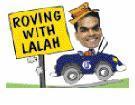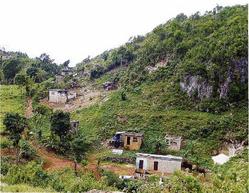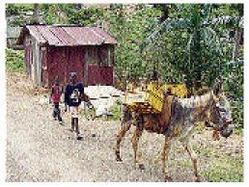Robert Lalah, Assistant Editor - Features


The scattered houses in Ginger Hall, Manchester. - photos by Robert Lalah
One sorry-looking black donkey tied to a tree and an alarmingly round ram goat staring blankly at me. Other than that, it seemed I was all alone. The sign at the bottom of the hill read Ginger Hall and I was longing to see someone with whom I could strike up a conversation. I had passed places like Bombay and Blue Mountain since I started climbing Melrose Hill in Manchester and was ready to find out more about this place.
It was a quiet journey up the hill, not many people out on the streets. In Ginger Hall, I found myself on an incline overlooking a few small, wooden homes scattered along the mountainside. There was the donkey and the goat, but no one else. Then I heard a strange noise behind me.
Clip clop, clip clop. I turned to see another donkey, this one with what looked to me like milk crates strapped to it, heading up the hill in my direction. Two young boys were walking behind the animal, one holding a rope that was attached to the donkey.
"Mawning!" they said in unison. I returned the greeting and asked where everyone was. "Most a dem gawn a bush, but see di rest a dem behind you," said the taller of the two boys. I looked around and, much to my surprise, saw about 10 people - men, women and children - standing a few feet behind me. They were all staring at me with looks that suggested to me that there haven't been many visitors to this community in recent times.
Uncomfortable feeling
I started feeling uncomfortable with all the eyes glued to me and was most relieved when a woman, with short hair tucked neatly under a scarf, spoke up. "Welcome sar," she said, walking towards me. She was a stout woman in her 50s, perhaps, and was wearing a long skirt and sandals. She moved slowly and didn't smile much. I introduced myself to her and the rest of the group and told them that I was interested in learning more about the community of Ginger Hall.
Their faces seemed to brighten a bit, much to my relief. "Well, come out a di sun nuh man," someone said. She was an older woman with purple hair and white tennis shoes. I followed her lead and walked over to the shade of a large mango tree. About five persons, two men and three women, walked with me while the others stayed where they were and continued to stare in my direction with an intense look of curiosity on their faces.
"So what you really would like to know now sar?" said the woman in the tennis shoes who introduced herself as Miss Marva. A closer look revealed a huge hole in the front of her left shoe. I asked her how many people lived in Ginger Hall. "Well, is just who you see here. This is the end of di hill. If you continue to climb you not going to reach anywhere else, you gwine haffi come back down for no more place nuh up deh. Is just a handful a we live here and so when we see people like you come up here, dat is why all a we come out, for is must one a we you come to. Down di hill you have more people, but up here, is we alone," she said. I asked her if the few people who lived up there had a good relationship with each other.
One family
"Hee, hee! Den nuh mus?" she squealed. "Look how far we is from everything and everybody else. We haffi live good for we is one likkle family up here inna di hills. We nuh have nuh time fi fuss and fight. What we have we share with each other," she said, to nods of approval from the rest of the gathering.
An elderly man, who told me to call him Smith, asked me what was happening in Kingston theses days.
"Di last time mi go dem place deh was when me and mi sister dem go buy furniture one Christmas when mi was a lilly pickney. Mi remember mi did see di ship dem a come in and it was a magnificent sight," said he. Smith is approaching 70 years old and seemed most interested in finding out all he could about the happenings in the capital city.
"So mi hear seh dem all have naked statue now a town. What a sinting! You have any picture a it?" asked Smith. I told him that I didn't and he seemed most disappointed. I had to promise him that I would take a picture of it and give it to him whenever I returned to the area. He seemed pleased.
The people of Ginger Hall, according to this small group, are mainly farmers. Those who weren't there to speak with me were out tending to their animals or crops. "Dem not coming back in until later on in di evening. When dem come, I will tell dem dat you did was pass through and dat you say hello," said Smith.
I thanked him for the gesture and bid the group goodbye. To this, I received a response in chorus. "Walk good!" they said, with Smith adding "Memba di picture when you coming back again!"
robert.lalah@gleanerjm.com

- A donkey and two lads make their way up a hill in Ginger Hall, Manchester.

